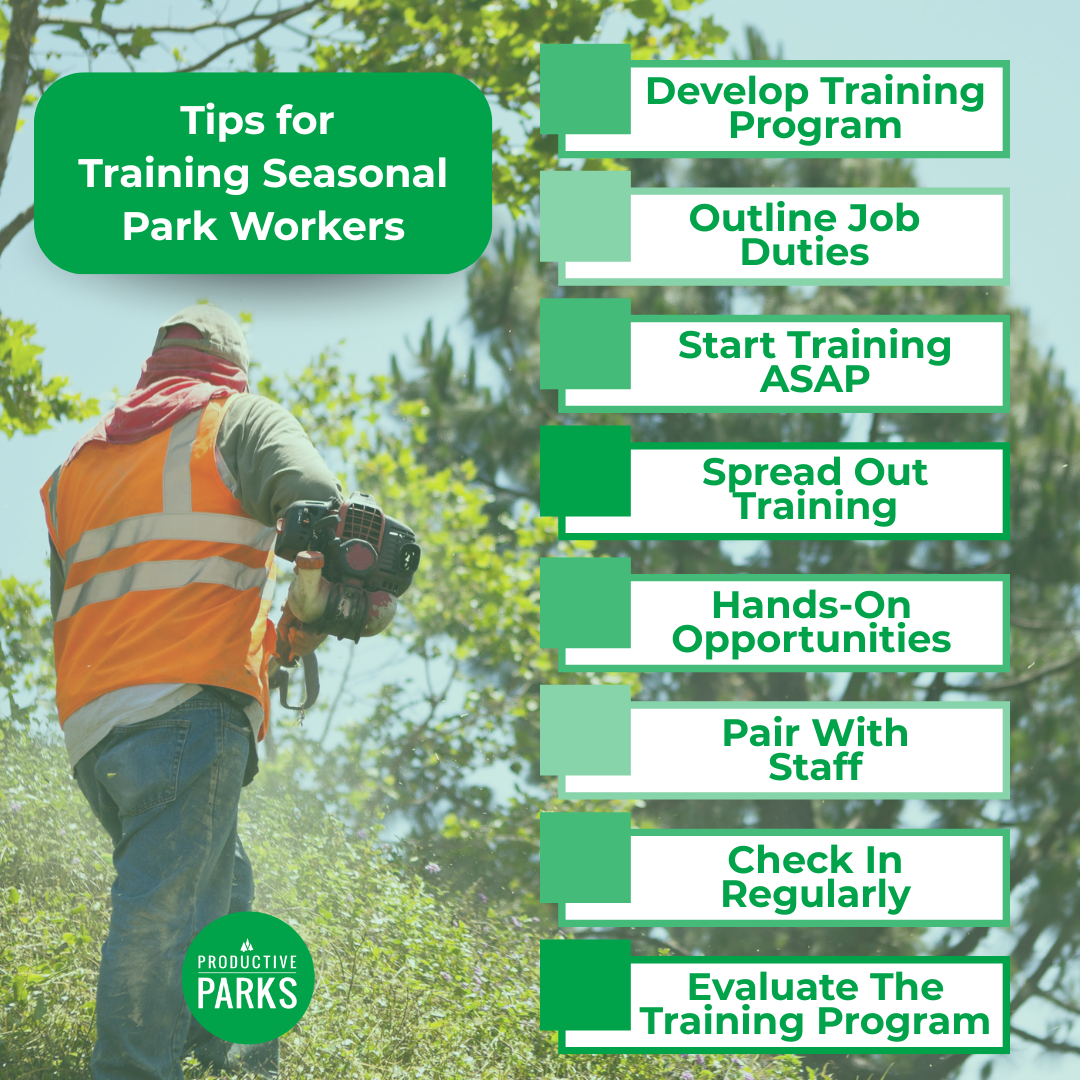
Training seasonal park maintenance staff shouldn’t be an afterthought.
You worked hard to secure quality seasonal staff for the busy season. Now it is time to make sure they get the training to complete their tasks successfully.
A thorough, concise training program empowers seasonal park maintenance staff to serve your agency productively. Your maintenance team will operate more efficiently, your full-time staff will get the support they need, and you will have a better chance of retaining workers for next year.
Get some tips and strategies to help make and implement an effective seasonal park maintenance staff training program.

Develop a Standard Seasonal Staff Training Program
Seasonal staff onboarding training outlines the duties and expectations for temporary employees.
Start developing the training program by mapping out what your seasonal staff will be doing. Will they have the same types of tasks most of the time? What sites will they work? What are some tasks they may be asked to do outside of their ordinary duties (e.g. severe weather cleanup, special event setup, etc).
You want to ensure staff know the processes and procedures for everything in their job description. Determine if any cross-training with other departments would be helpful. For example, seasonal park maintenance staff may have to help with events during a busy tournament weekend.
Training should also include essential topics like heat-related illness, interacting with the public, reporting issues, and emergency procedures.
Once you have the training program outlined, the following tips will help you implement it.
Clearly Outline Job Duties with Checklists
For routine tasks like closing and opening duties, consider making checklists that seasonal staff can use as a reference. The more easily accessible documentation you have for your temporary staff, the less guesswork is required of them.
For example, if they can check off park closing duties as they do them on a tablet, it gives them an easy way to keep track of what still needs to be done while documenting what they did.
Start Training as Soon as Possible
Your seasonal park maintenance staff have a limited time with your agency. The busy season ramps up quickly. Find ways to start the training process as soon as possible. For example, once the staff gets hired, assign them self-guided online training modules for topics like standard operating procedures, policies, and safety protocols.
Completing some general training before the seasonal staff report for duty helps get them up to speed quicker. They can focus on the most relevant training in person.
Spread Out Training If Necessary
A long day of back-to-back lectures and training videos may be a great way to squeeze everything in quickly, but how much will your seasonal staff remember at the end of the day?
Figure out the highest priority training to get staff started. What are the tasks they will be doing the most at the start of the season? Is special equipment involved? Do they have to access digital inspection or to-do checklists? How do they report the completed work? Make the most relevant and important information front and center.
Also, determine if you can defer some training for later in the season. For example, if most of their early-season tasks involve mowing and landscaping, focus the initial training on that. Then, if ballfield maintenance becomes more of a focus once summer rolls around, set up an in-service day closer to when ball games start.
Provide Hands-On Learning Opportunities
Individuals learn differently. Many maintenance staff benefit from experiential training. Hands-on training activities give employees direct experience with the tools and equipment they’ll be using throughout the season.
Once seasonal staff report for duty, get them familiar with the tasks and areas they will spend most of their time. Let them walk through parks or facilities with experienced staff so they understand the scope of their work. Create a workshop for inspecting and maintaining the equipment they’ll be using.
Hands-on learning lets seasonal staff ask relevant questions and get a feel for what they will be doing daily. It can also give a sort of “muscle memory” to make it easier to recall tasks and instructions.
Pair with More Experienced Staff
Give new staff the opportunity to pair up with veteran seasonal staff or full-time staff. Seeing tasks get completed in person can be more effective than written instructions or training videos. It also gives staff an opportunity to ask questions and get feedback in real time.
Make sure the staff you choose as mentors are willing and able to be good examples. Staff who work with a positive, professional demeanor can set the tone for the entire maintenance team’s culture.
Check in Regularly
Take some time to check in with seasonal staff. Ask if they feel comfortable and confident completing their work. See if they are encountering any roadblocks or issues. Compliment the work they’ve been doing so far.
Also, see if they have any suggestions and insights that can be helpful for your agency’s maintenance and operations. Sometimes a new perspective and a fresh set of eyes can bring new ideas.
You never know what could come up in a simple, informal conversation.
Evaluate Your Training Program
It never hurts to start planning for next year. Evaluate your seasonal worker training program. Get input from seasonal, full-time, and managerial staff. If you used different training methods, find out what was most effective.
Also, determine if there were any knowledge gaps that could be addressed by amending the training program.
The Takeaway
Seasonal staff can be an asset to your agency, especially during the busy growing season. A carefully thought-out training program can set seasonal staff up for success. By understanding the scope of work, the different ways people learn, and scheduling training when it is most effective, your temporary staff can have a great season.
